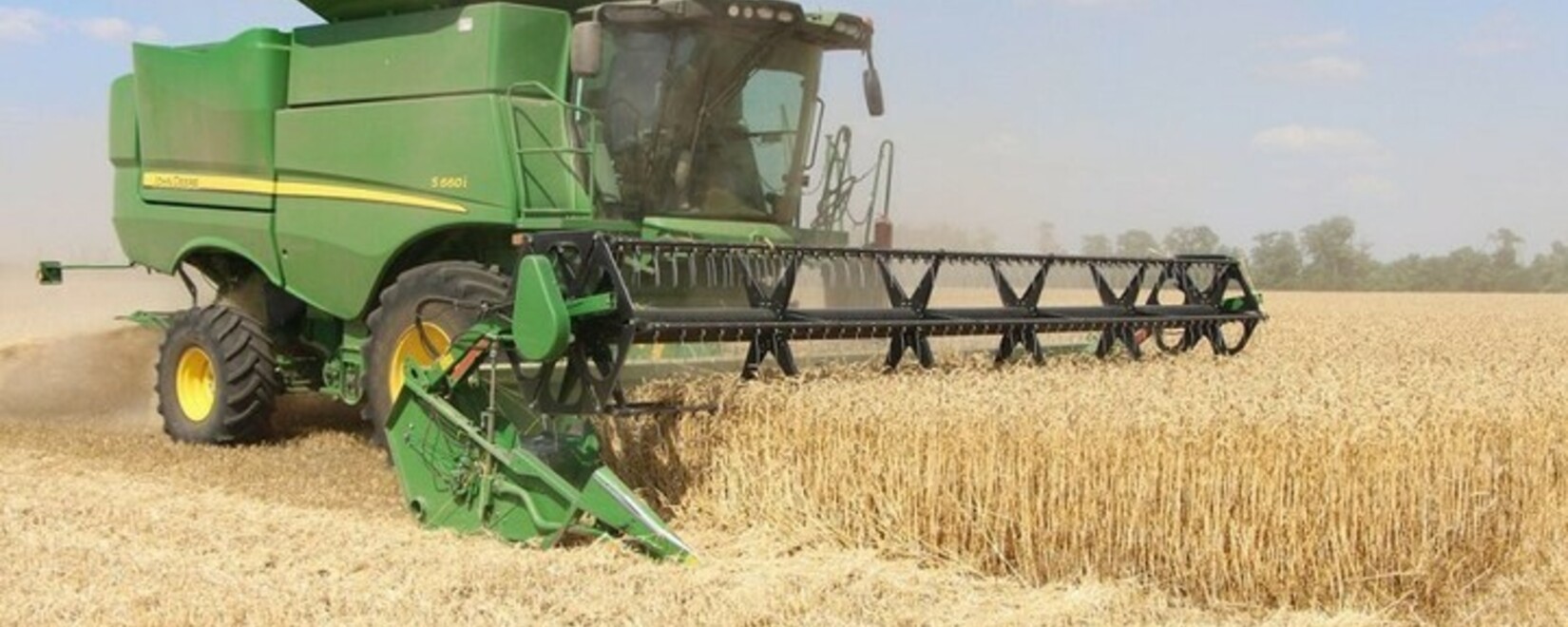In the second decade of June, harvesting began in the North Caucasus. Agricultural departments of all levels report that enterprises are fully provided with everything necessary for harvesting in the shortest possible time, and granaries are ready to accept a new crop. Farmers confirm their readiness to harvest, but some still fear that with rising costs, product prices will not allow the business to fully develop. Pole.rf magazine interviewed the farms of the South and found out how they begin their suffering.
Harvest progress
The regions of the North Caucasus were the first to start harvesting - according to the Ministry of Agriculture of Russia, as of June 16, in three subjects - the Republic of Dagestan, the Chechen Republic and the Stavropol Territory - a total of 2.9 thousand tons of grain were collected.
The Ministry of Agriculture of the Stavropol Territory told Pole.rf that harvesting began on June 14. The first crop in the harvesting campaign was winter barley.
“Currently, the harvest is being held in 12 districts of the region - Budennovsky, Kursk, Neftekumsky, Sovetsky, Stepnovsky, Novoselitsky, Arzgirsky, Levokumsky, Aleksandrovsky, Blagodarnensky, Petrovsky, Kirovsky,” shared a representative of the press service of the regional department on June 20.
At that time, 6.8 thousand hectares were harvested, the gross harvest amounted to about 20.2 thousand tons of grain, the yield was 29.9 centners per hectare, due to drought it was 3.6 centners lower than last year's figures.
Agrarians of the region are provided with everything necessary - machinery, fuel, fertilizers, personnel.
“Agricultural enterprises and peasant farms of the Stavropol Territory have a sufficient machine and tractor fleet, which allows farmers to carry out the entire range of field work in a quality and timely manner,” a representative of the Stavropol Ministry of Agriculture shared with field.rf.
Agricultural producers have at their disposal about 6.4 thousand grain harvesters that will take part in the harvest. However, during the peak harvest period, farms attract additional capacity. 7.5 thousand trucks, 19.7 thousand tillage machines and tools will also be involved in harvesting and related work.
All enterprises of the region are ready to receive the new harvest. Their total storage capacity for grain products is 10 million tons: 7.5 million tons of storage facilities, currents, shipping sites, plus 2.5 million tons will be able to take elevators.
For the timely and high-quality implementation of the main agrarian campaign of this year, 48.6 thousand tons of diesel fuel and 5.1 thousand tons of gasoline have been stocked at the oil depots of the Stavropol region.
Downpours hamper cleanup in country's granary
Agricultural producers of the Krasnodar Territory have also started harvesting, despite the fact that the process is far from being favorable for the weather in all districts of the region. Lidia Kukharenko, Chief Agronomist of Pokrovsky Concern Group of Companies, told pole.rf magazine that the company began harvesting winter barley very carefully, and, in fact, works in manual mode.
“Large-scale field work is hampered by unusual weather conditions this year – torrential downpours in the South and the Caucasus led to flooding of fields and damaged crops,” she said. — Our fields are located in 17 districts of the Krasnodar Territory, from the southernmost point of the region to the northern foothill zones on the border with Karachay-Cherkessia. Barley moisture on them now ranges from 16% to 25%, with a base value of 14%. Therefore, we select dry areas pointwise, up to the point that we mow only the middle of the field, leaving the edges, and the harvested grain is immediately sent to elevators, where it is worked, dried and brought to marketable condition.
By June 20, about 620 hectares were harvested in the concern, the barley yield was about 75 centners per hectare.
For a full-fledged start of the harvesting campaign, dry and hot weather is needed, which will dry the fields and allow the equipment to be withdrawn, Kukharenko emphasized.
“We have a lot of work ahead - in the next month, the concern's farms will harvest grain crops from almost 100 thousand hectares, more than 380 units of grain harvesting equipment will be simultaneously involved in the campaign,” she shared.
By the time of the harvest, all equipment at the company's enterprises was repaired and ready for work, consumables were purchased and delivered to the farms, their staffs were fully staffed.
“If we compare the current warehouse stocks at our elevators with previous seasons, now they are minimal. In 2022, we received not only a record harvest for the main crops, but also a very high quality of the grain itself, which made it possible to sell it quickly and at a good price,” said Maxim Misharev, production manager at Pokrovsky.
The concern exports grain to more than two dozen countries of the world, supplies it to large wholesale buyers on the domestic market, and also uses it in its own processing. At the moment, the company's elevator capacities are ready to accept a new crop, all the necessary sanitary treatments have been carried out.
“In the 2023/24 agricultural season, we plan to load our elevators to the maximum, their total capacity allows us to simultaneously store up to 500 thousand tons of agricultural products, and the annual grain turnover exceeds 1.6 million tons,” Misharev shared.
At the time of preparation of the material, not all of the interviewed farmers of the Kuban started harvesting. A farmer from the Novopokrovsky district of the region told in mid-June that usually winter wheat harvesting begins on June 25 in dry years, in ordinary years - by early July, in seasons when there is high humidity - in the middle of the first decade of July. Harvesting of barley starts 5 days earlier than wheat.
At the time of the conversation, the farm had everything necessary to start the harvest: fuel, equipment ready for work, personnel. “We have prepared for the laying of a new crop and storage,” the farmer shared then. “Last year’s harvest has been sold in full.”
In the Progress agricultural firm from the Labinsky district of the Krasnodar Territory, harvesting for June 20 has not yet begun either. “I suppose that it will start on June 25 - at this time we will start harvesting barley, and on July 5–7 we will start harvesting wheat and rapeseed,” Alexander Nezhenets, general director of the enterprise, shared his plans then.
The agricultural firm has a large volume of winter crops, so there is a lot of work to be done. “We have repaired the equipment for the harvesting campaign, sold the products collected in 2022, and our storage facilities are free,” the head said.
Prices are on the verge of survival
According to a farmer from the Novopokrovsky district of the Krasnodar Territory, prices for grain and oilseeds in the outgoing season were very low and were on the verge of profitability. “At the same time, the cost of equipment, as well as fuels and lubricants, plant protection products, seeds, and spare parts literally flew into space!” he shared.
He clarifies that prices for plant protection products remained approximately at the level of last year, but emphasizes that in 2022 they increased significantly compared to 2021. Fuel prices have risen by 10% this year compared to last year. “The cost of spare parts and equipment has increased by an order of magnitude. For comparison, a couple of years ago a TORUM combine cost 20 million rubles, and now it costs 30 million rubles. This is quite a significant rise in price,” explains the farmer. At the same time, if last spring sunflower could be sold for 35-40 thousand rubles per ton, then this year in the same period, prices for it were at the level of 20 thousand rubles per ton.
The season ends with low prices for grains and oilseeds and the new one will also start, Nezhenets confirmed. At the same time, he draws attention, the cost of sowing and harvesting this year increased by 17% compared to last year.
“Accordingly, I cannot say that we are entering the new season with a joyful mood. Our task is simply to get through this year. We do not count on profit,” he stressed.
The introduced duties on crop products, the head added, are ruining this business. “I hope the officials understand this before it is too late,” he added.
For the development of agriculture, a profitability of at least 50% is needed, and the current prices for crop products this season are such that only thanks to the livestock division of Progress, it was possible to obtain an indicator of 20%. However, Nezhenets stressed, it is impossible to develop a business with such a profitability - it goes to cover growing costs. And it will not even allow to repeat the level of technological effectiveness of the past season in terms of the amount of fertilizers used, plant protection products, the purchase of high-quality and expensive foreign seeds, and equipment.
“Plus, you need to pay a decent salary to the staff, which is already difficult to keep in the countryside,” the head shared. At the same time, he admitted, this season the company has enough qualified personnel to carry out cleaning.
The leader said that in the USSR he worked as a deputy chairman of a collective farm - at that time the rate of return in agriculture was 103-105%.
“We grew products by order of the state, it bought the crop from us. We have complained that we are not given the freedom to grow the crops we want. Now we can do it, but we can’t even make money to fully develop the business,” he complains.

 Trading platform
Trading platform 
 Monitoring
Monitoring  Express applications
Express applications 
 Fork Work
Fork Work 
 Service
Service  News
News  Directory
Directory 
